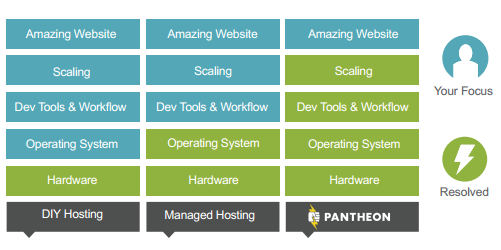Hosting Platforms in Focus: Pantheon

Obtaining a dramatic spike in traffic is every Web worker's dream, however, when the website's hosting provider can't handle the traffic increase and results in the site crashing, that dream quickly becomes a nightmare.
While one solution to this problem is to change your hosting provider or upsize your virtual private server (VPS), typically both of those alterations require some downtime for the site. Luckily, cloud-based hosting provider Pantheon offers a platform that aims to solve this problem.
In this first article in the "Hosting Platforms in Focus" series, we take a closer look at Pantheon, which allows users to build, launch and host Drupal sites. The platform uses one big gridded set of servers to power all of its clients, which range from sites that receive hundreds of page views a month to sites that receive hundreds of millions of page views a month. When a site runs on the Pantheon platform, it automatically uses the company's Edge Cache, which immediately improves page load times.
"It's a much more efficient way to serve out a page. (Edge Cache) acts like a CDN," said Zach Roen, CEO and co-founder of Pantheon. "It can very efficiently handle a huge amount of traffic at any one time."
Moreover, when a site is hosted on Pantheon, it is not running on its own siloed server. Instead, the site runs on the same infrastructure that is serving out hundreds of millions of page requests every day for all of the sites on the platform, which means that the site is a "pretty small drop in the bucket" in terms of the service's overall capacity, according to Roen.
It is also important to note that Pantheon offers separate development and testing environments to its users, which allows them to try new site features without interfering with their live site. This can help developers eliminate costly mistakes and/or downtime. Additionally, Pantheon allows developers to import and migrate their current sites to the Pantheon platform, supports all versions of Drupal, enables users to manage multiple sites from a single dashboard, allows for one-click Drupal core updates, as well as lets users schedule automatic backups and determine retention periods.










